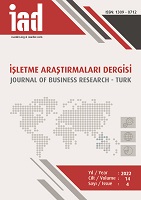Electronic Word-of-Mouth, Affective Commitment, and Consumer Buying Behavior in Healthcare Services during the COVID-19 Pandemic
Electronic Word-of-Mouth, Affective Commitment, and Consumer Buying Behavior in Healthcare Services during the COVID-19 Pandemic
Author(s): Iman Aghaeı, Sina Poorkhaje NamaghiSubject(s): Business Economy / Management, Health and medicine and law, Sociology of the arts, business, education, Socio-Economic Research
Published by: İşletme Araştırmaları Dergisi
Keywords: Affective commitment; Consumer buying behavior; Electronic word-of-mouth (EWOM); Healthcare services;
Summary/Abstract: Purpose – As electronic word of mouth or EWOM has turn out to be an overriding data source for customers who buy products digitally, therefore, understanding how EWOM affects customer buying behavior (CBB) becomes quite important. Despite its significance, there aren’t adequate studies that have investigated EWOM and its impact on consumers’ decisions to acquire good(s) or service(s). As the earlier researchers divided EWOM to receiving and participating categories, this study set out to determine how participating EWOM affects customer behavior in the health sector. Additionally, this study looks at how does affective commitment mediates the relationship between the two forms of participating EWOM (intensity and content) and consumer purchasing behavior. Design/methodology/approach – The data has been gathered via a self-administered questionnaire. There were two sections made for the questionnaire form. 164 hospitals’ consumers were asked to rate their overall perceptual outlook on 27 questions to measure the participating EWOM constructs, as well as their beliefs regarding affective commitment, and purchasing behavior; 141 responses (86%) were deemed acceptable. The study focuses on North Cyprus hospitals’ patients who searched and decided about the health services on digital media. Findings – Participating EWOM components demonstrated positive impacts on affective commitment, according to the PLS-SEM analysis. The findings also disclosed a positive influence of affective commitment on customer purchasing behavior. Discussion – The results of this study approved that when people welcome to participate EWOM, the benefits of EWOM become apparent. Based on this research, hospitals’ managers and health sector decision makers should try to design and implement the suitable strategies for achieving further EWOM if they desire to boost their brand competitiveness.
Journal: İşletme Araştırmaları Dergisi
- Issue Year: 14/2022
- Issue No: 4
- Page Range: 2669-2685
- Page Count: 17
- Language: English

